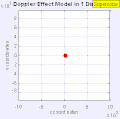Doppler effect
Doppler effect is a phenomenon observed in the fields of Physics and Sound where there is a change in frequency or wavelength of a wave in relation to an observer who is moving relative to the wave source. It is named after the Austrian physicist Christian Doppler, who proposed it in 1842 in Prague.
Overview[edit]
The Doppler effect can be described as the effect produced by a moving source of waves in which there is an apparent upward shift in frequency for observers towards whom the source is approaching and an apparent downward shift in frequency for observers from whom the source is receding. It is commonly heard when a vehicle sounding a siren or horn approaches, passes, and recedes from an observer.
Mathematical Representation[edit]
The formula for the Doppler effect is derived from the definitions of velocity and acceleration. The formula is:
f' = f (v + vo) / (v + vs)
where:
- f' is the observed frequency,
- f is the emitted frequency,
- v is the speed of sound in air,
- vo is the speed of the observer,
- vs is the speed of the source.
Applications[edit]
The Doppler effect is utilized in many areas of science and technology. Some of the applications include:
- Astronomy: The Doppler effect is used in astronomy to measure the velocity at which stars and galaxies are approaching or receding from us, that is, their radial velocities. This is used to detect if an apparently single star is, in fact, a close binary and even to measure the rotational speed of stars and galaxies.
- Medical Imaging and Blood Flow Measurement: The Doppler effect is used in medical imaging and blood flow measurement to measure the direction and speed of blood flow through the heart and major arteries.
- Radar: The Doppler effect is used in radar to measure the velocity of detected objects. This can be used to measure the speed of a car or the speed and direction of a weather system.
See Also[edit]
|
|
|
Doppler effect[edit]
-
Doppler effect diagrammatic
-
Doppler frequency
-
Picture of the first 'wall formula' in the city of Utrecht
-
Doppler effect stationary
-
Doppler effect source moving right at mach 0.7
-
Doppler effect source moving right at mach 1.0
-
Doppler effect source moving right at mach 1.4
-
Emergency transport in Rotterdam
-
Redshift
-
Radar gun
-
Carotid Doppler
-
Satellite Doppler
Ad. Transform your life with W8MD's Budget GLP-1 injections from $75


W8MD offers a medical weight loss program to lose weight in Philadelphia. Our physician-supervised medical weight loss provides:
- Weight loss injections in NYC (generic and brand names):
- Zepbound / Mounjaro, Wegovy / Ozempic, Saxenda
- Most insurances accepted or discounted self-pay rates. We will obtain insurance prior authorizations if needed.
- Generic GLP1 weight loss injections from $75 for the starting dose.
- Also offer prescription weight loss medications including Phentermine, Qsymia, Diethylpropion, Contrave etc.
NYC weight loss doctor appointmentsNYC weight loss doctor appointments
Start your NYC weight loss journey today at our NYC medical weight loss and Philadelphia medical weight loss clinics.
- Call 718-946-5500 to lose weight in NYC or for medical weight loss in Philadelphia 215-676-2334.
- Tags:NYC medical weight loss, Philadelphia lose weight Zepbound NYC, Budget GLP1 weight loss injections, Wegovy Philadelphia, Wegovy NYC, Philadelphia medical weight loss, Brookly weight loss and Wegovy NYC
|
WikiMD's Wellness Encyclopedia |
| Let Food Be Thy Medicine Medicine Thy Food - Hippocrates |
Medical Disclaimer: WikiMD is not a substitute for professional medical advice. The information on WikiMD is provided as an information resource only, may be incorrect, outdated or misleading, and is not to be used or relied on for any diagnostic or treatment purposes. Please consult your health care provider before making any healthcare decisions or for guidance about a specific medical condition. WikiMD expressly disclaims responsibility, and shall have no liability, for any damages, loss, injury, or liability whatsoever suffered as a result of your reliance on the information contained in this site. By visiting this site you agree to the foregoing terms and conditions, which may from time to time be changed or supplemented by WikiMD. If you do not agree to the foregoing terms and conditions, you should not enter or use this site. See full disclaimer.
Credits:Most images are courtesy of Wikimedia commons, and templates, categories Wikipedia, licensed under CC BY SA or similar.
Translate this page: - East Asian
中文,
日本,
한국어,
South Asian
हिन्दी,
தமிழ்,
తెలుగు,
Urdu,
ಕನ್ನಡ,
Southeast Asian
Indonesian,
Vietnamese,
Thai,
မြန်မာဘာသာ,
বাংলা
European
español,
Deutsch,
français,
Greek,
português do Brasil,
polski,
română,
русский,
Nederlands,
norsk,
svenska,
suomi,
Italian
Middle Eastern & African
عربى,
Turkish,
Persian,
Hebrew,
Afrikaans,
isiZulu,
Kiswahili,
Other
Bulgarian,
Hungarian,
Czech,
Swedish,
മലയാളം,
मराठी,
ਪੰਜਾਬੀ,
ગુજરાતી,
Portuguese,
Ukrainian











